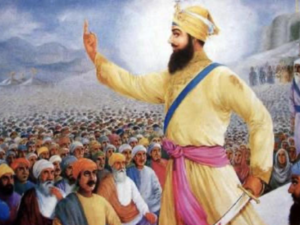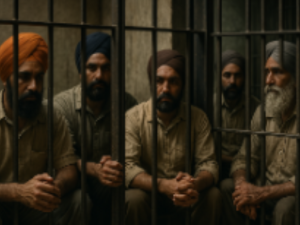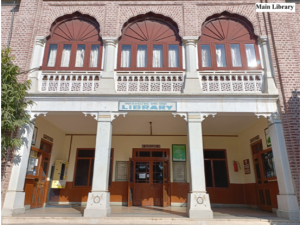Kesar Singh Chibber, the author of Bansavalinama Dass Patshahian Ka, was born in 1699 CE in Jammu. This birth evidence is based on an internal testimony of his Kav Granth. Before giving information about Kesar Singh, it is also important to get acquainted with his elders. Kesar Singh Chibber's great-grandfather's name was Dargah Mall Chibber who was called Brahmin. The elders of Dargah Mall were also associated with Guru’s house. The Gurus from time to time gave important responsibilities to these Sikhs. Dargah Mall Chibber was very loyal and possessed a sharp intellect. Due to which Guru Har Rai had appointed him as his Diwan. Even during the period of Guru Har Krishan, it continued to carry out the work of Diwan. Even during the time of Guru Tegh Bahadur, he performed the duties of Diwan for some time. When Guru Harkrishan Sahib left for Delhi, Diwan Dargah Mall was with him till the last moment.
From Kiratpur Sahib when Guru Tegh Bahadur went to other towns on June 10 June 1656 for Sikh preaching, apart from the Guru's family, only a select few Sikhs from Jammu Kashmir accompanied him like Dargah Mall Chibber, Balu Hassan, Baba Almast, Chupat Rai Chibber etc. as companions. With Guru Sahib they went to Haridewar, U.P, Bengal, Bihar, Assam. The ceremony of handing over the Guruship to Guru Tegh Bahadur was completed on 11th 1664 August, then Diwan Dargah Mall Chibber among others had a special role. On 9th October 1664, Bhai Makhan Shah Lubana from Mota Tanda (Kashmir) reached Bakala with his Vanjara family and shouted
“Forget Sangat! “Guru Ladho Re, Guru Ladho Re,Guru Ladho Re”, three times. When Guru Tegh Bahadur came to Amritsar from Bakala, Diwan Dargah Mall was also with him. On May 10, 1665, Guru Tegh Bahadur went to Bilaspur to attend the final prayers of Raja Deep Chand Kahluria, accompanied by Diwan Dargah Mall Chibber among others. When Guru Tegh Bahadur started the foundation of a new village on the mound of Makhowal on 19th June 1665 , then Diwan Dargah Mall Chibber offered prayers. By the order of Emperor Aurangzeb, when Alam Khan Ruhela arrested Guru Tegh Bahadur on 8th November 1665, Bhai Mati Das was also arrested along with Guru Sahib. All these Chibbars belonged to the same dynasty. When the news of this arrest reached Chowk Nanaki, Diwan Dargah Mall Chibber and Chaupat Rai Chibber went to the bungalow of Raja Jai Singh Mirza of Delhi and narrated the whole conversation to Pushpa Devi and Kunwar Ram Singh . After consulting Emperor Aurangzeb, he ensured the release of Guru Sahib and the Sikhs. Guru Sahib and the Sikhs were released on December 19,1665 . All the Sikhs, including Diwan Dargah Mall, accompanied Guru Sahib and reached Mathura, Agra Allahabad, Banaras, Sasaram and Gaya preaching Guru Nanak's ideology reached Patna. Being aged, Diwan Dargah Mall, unable to perform the responsibility of the Diwani, requested and appointed his two sons, Sahib Chand and Dharam Chand, in charge of the treasury and Diwani. Both these responsibilities were given to him by Guru Gobind Singh himself. Dharam Chand Chibber's son was Gurbakhsh Singh Chibber, who was appointed by Guru Gobind Singh as the treasurer of his treasury. For some time there were Bhai Sati Das Chibber and Bhai Mati Das Chibber, the Diwan of Guru Tegh Bahadur, who were recommended to Guru Sahib by Diwan Dargah Mall. When Guru Gobind Singh was sitting on the throne of Guruship, by the order of Guru Sahib, Bhai Chaupat Rai had bestowed titles on Dharam Chand and Sahib Chand Chibber, as the responsibility of Diwan. Kesar Singh Chibber was the son of Gurbakhsh Singh Chibber (Droga) who wrote his famous Granth "Bansavalinama Dass Patshahian Ka".
Dr Ratan Singh Jaggi has done a commendable job by publishing this manuscript of poetry in the journal 'Parakh' of Panjab University, Chandigarh. The text of Kav Granth shows that it was completed in 1769. After a serious reading of this Granth, one becomes convinced that this Granth was composed by him (Seva Singh) in the context of his request for the interpretation of 'Earth and beyond'. The dates of birth and death of Kesar Singh Chibber are still in need of research. He completed this Granth when he was seventy years old. There are 14 Charans(steps) in this Kav Granth. Their description is as follows:
Guru Nanak = 153 Verses, Guru Angad = 142, Guru Amar Das = 106,Guru Ram Das = 37,Guru Arjan = 142,Guru Hargobind Sahib =168,Guru Har Rai Sahib = 18, Guru Har Krishan = 41,Guru Tegh Bahadur = 166,Guru Gobind Singh = 737, Banda Singh Bahadur = 67, Jeet Singh = 104, Mata Sahib Dei= 3, Situation of contemporary Sikhs = 646, Total = 2563 verses .
The important feature of this Kav Granth is that the dates given in it in large numbers have not been mentioned in any other book or Granth. Kesar Singh also places great emphasis on these dates. Internal evidence shows that he has taken all these dates from a 'Vahi'. He himself writes that I had a 'Vahi' of Guru Gobind Singh but when his house was burnt down in Jammu, apart from other valuable documents, that 'Vahi' was also burnt. When I look at the dates in between, most of the dates match the Bhat Vahis.
Many important events are not even mentioned in this Granth. In this Granth Sikh Guru Sahibs have been coated with mythical Puranik colours. Attempts have been made to illustrate Sikh Gurus in Puranic environments and the Brahmanism coatings. So, Bansavalinama should be quoted with utmost care. Among the other manuscripts of Kesar Singh Chibber that are available are 'Sobha Sri Amritsar Ji Ki' and 'Baranmah' which were in Dr Ganda Singh's personal library.





